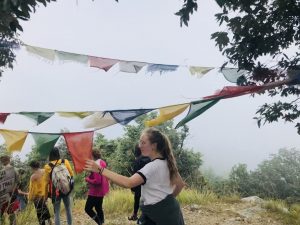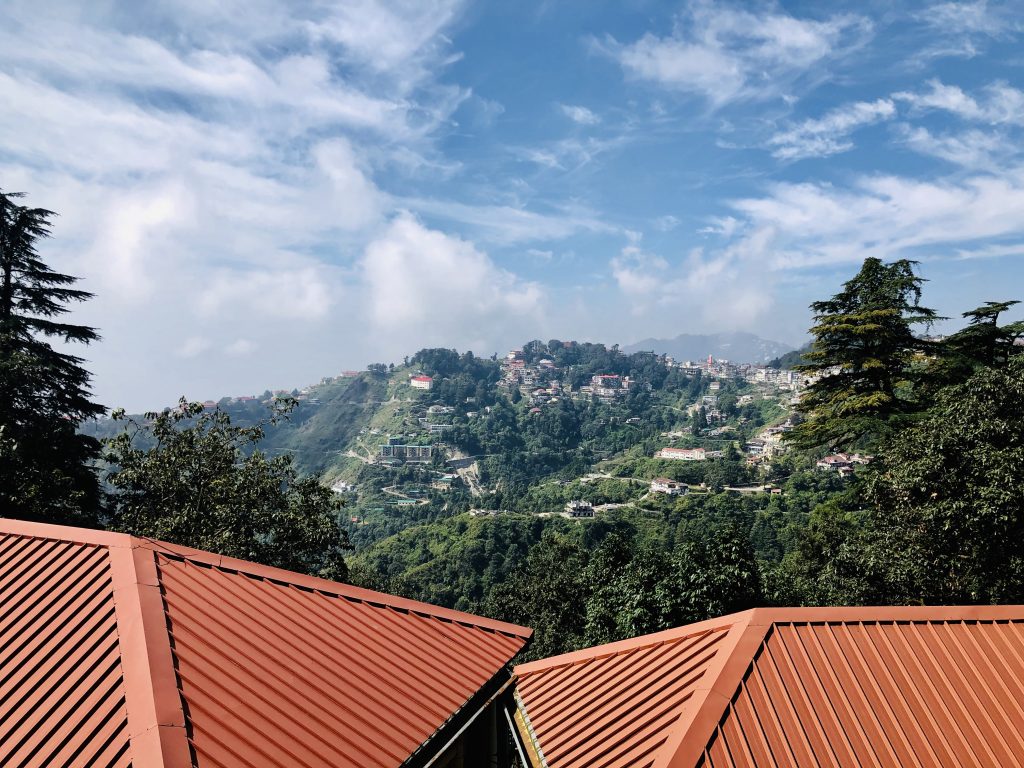Making Whole in Mussoorie
After a few days relaxing in Zanzibar, our group was looking forward to a week full of activities in India. Unfortunately, our time in the country began with a bit of a catastrophe. Because of visa compilations, one of our group members was denied entry to the country and had to move on to China, where we’ll meet him at the end of the week. We’ve been missing you, Noah 🙂
Once we got through the initial emotional turbulence of moving on without a member of our family, we set out for the Lotus Temple, one of nine Baha’i temples in the world. The temple is structured beautifully, with sets of nine petals surrounding one main room – a place where people of all faiths are invited to pray and meditate. None of us knew much about the practices of the Baha’i faith before this visit, but we all left talking about how refreshing it was to be in such an accepting space. Next, we visited a Sikh temple, which greeted us with a gorgeous entryway that involved walking barefoot through a small pool of water before ascending stairs into the main room where people were praying and worshiping. The sounds of the singers and musicians inside the temple were broadcast through speakers outside, and we heard their songs as we admired the large pool of water behind the temple at dusk.

Early the next morning, we boarded a train and headed north through the Indian countryside. We got off in Dehradun and loaded onto a bus to head to the little mountain village of Mussoorie. After an hour of twists and turns, we ended up at the Hanifl Center, an outdoor education center affiliated with the neighboring Woodstock International School. Our leading professor, Dr. Leer, has connections to the school because many St. Olaf student teachers have been sent there over the years. None of us really knew what we were getting into, but were immediately grateful she had vouched for this excursion to be added to our India itinerary when we met the passionate people running the center. One such staff member, Nandini, quickly organized a hike taking us up higher into the mountains to see the sun set over the Himalayas, coming back down just in time for dinner. We all spent the way back discussing how we wished we had more than just two days there.

Luckily, we had plenty of opportunities to interact with the nature around us. The next morning, we hiked up and around the main town of Mussoorie, during which we ran into a woman named Kathryn whose sister graduated from St. Olaf (it really is a small world!). After lunch we set out on another hike, this time in Jabarkhet Nature Preserve, which provided more views of the massive mountains surrounding us, and a humbling reminder of our place in nature. This hike brought us to the top of a hill that was literally in the clouds – a few passed over us as we stood there in admiration. In the trees above us, people had strung up Tibetan prayer flags, which are small pieces of fabric colored to represent the elements, and covered in prayers of peace. It is believed that when the wind blows through the flags, the prayers are carried in the wind to bless anyone they come into contact with.
That night, we headed to the local bazaar to shop, and were excited to find that a Hindu parade was in full swing. Dancers were performing in the streets dressed in gorgeous traditional garments, and the whole procession was led by a huge brass band. As the parade passed, we enjoyed looking around local shops selling jewelry, clothing, and decorations. On the ride home, and once we got back to Hanifl, we all gushed about the fun things we had found and were excited to wear ourselves or give as gifts to our loved ones back home.
On Monday, we headed up to the main Woodstock campus for a school tour. We were greeted by Amy, a teacher and administrator at the school. She eloquently outlined the goals of the school, explaining that when designing their curriculum they first asked, “what kind of person do we want to send out into the world?” They decided that the characteristics they hoped to instill in their students were first a strong sense of self, then healthy interpersonal collaboration, skills needed to succeed in the 21st century, and good citizenship committed to justice and sustainability. She was soon joined by Woodstock’s principal, Dr. Craig Cook, who added a few thoughts on the school’s values and explained a bit about his personal educational background. He told us that he was trained as a sociologist, and that he later chose to enter the educational field because, “sociology is about deconstructing everything, but then we have to find a way to make whole again.” He elaborated by saying that after spending so much time analyzing society and its constructs, he needed a way to move forward, and he found that in educating the next generation to be justice-seeking citizens.

Stepping out into the courtyard after this little impromptu sermon, a few students and I expressed how touched we were by the principal’s statement about “making things whole.” Though he was talking about his training in sociology, we each made connections to our respective areas of study and how we felt the same urge to do something to reconstruct the topics that we have been passionately picking apart in our studies.
Ever since this conversation, I find myself thinking about “making whole” an awful lot. On a personal level, my major, Women’s & Gender Studies, prompts me to do a lot of deconstructing the societal constructs that create our gendered world. I’m still not quite sure where I see myself after graduation, but this day certainly solidified that instead of continuing to deconstruct for years to come, I’ve got to be doing something that uses my education to move forward and promote wholeness in a society that is more divided than connected. On a group level, we do a lot of deconstructing on this program. Topics such as colonialism, ethical travel, and what constitutes a quality education permeate many of the conversations we have, both in and out of the classroom. These issues are ones that we will never come to definitive conclusions on, and we have committed to “accepting and expecting non-closure.” Living in the limbo of caring deeply about these issues, but not being able to resolve them has been difficult, though being encouraged to “make whole” was positively reinvigorating and provided a new perspective on what the purpose of all of this traveling is anyway. Perhaps it’s not about gaining any sense of clarity on these messy issues, but rather about using the experiences we’ve had with them to inform the ways in which we attempt to make whole in the things we pursue.
— Alexa Sorensen ’22
You must be logged in to post a comment.